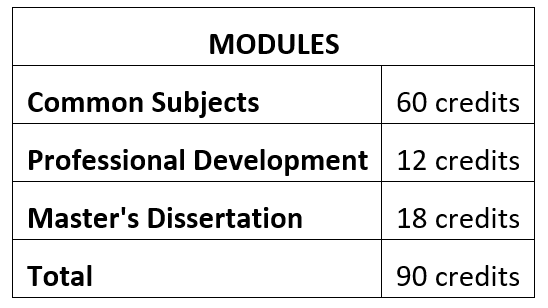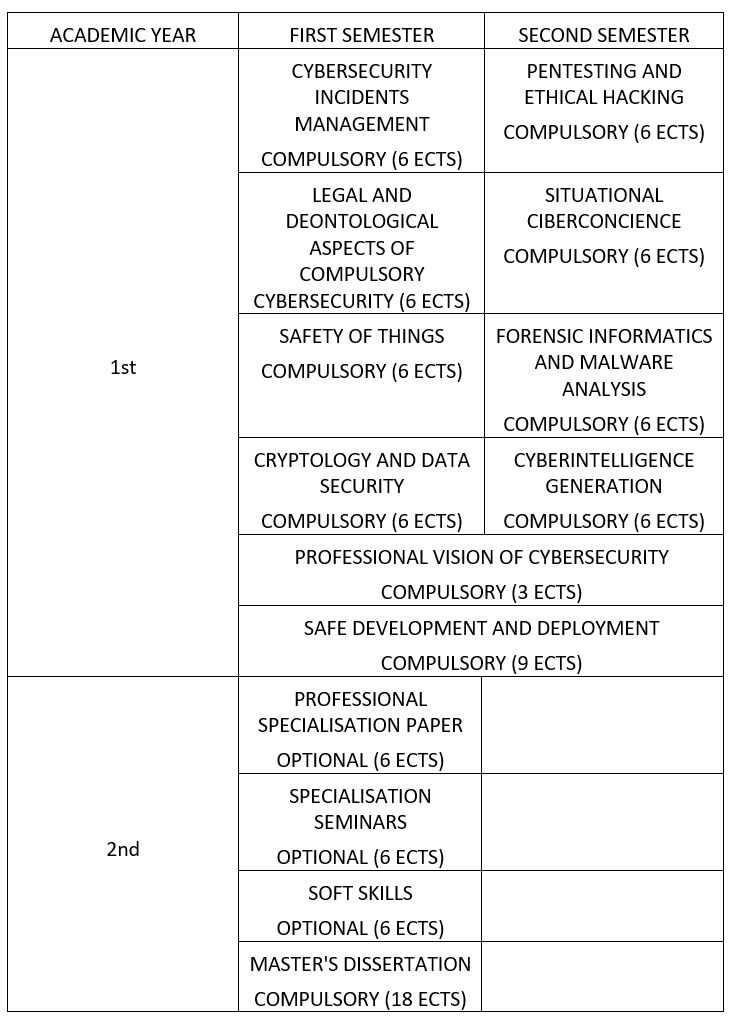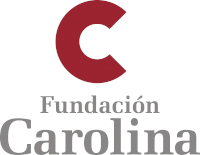 Vera (València) Campus, Universitat Politècnica de València
Vera (València) Campus, Universitat Politècnica de València
Master's Degree in Cybersecurity and Cyberintelligence
90 credits
Credit 35,34 €
(2024/2025)
30 openings
(2024/2025)
INTRODUCTION
The "National Cybersecurity Strategy", published in the BOE on 30 April 2019, defines the following: The activities carried out in cyberspace are fundamental for today's society.
The technology and infrastructure that are part of cyberspace are strategic elements, which are transversal to all areas of activity, with cyberspace vulnerability being one of the main risks for our development as a nation. Therefore, the training of professionals of the highest level in this field is fully justified. The main motivation of the Master's Degree in Cybersecurity and Cyberintelligence is to enable its graduates a better job placement in an area where professional demand is not only growing, but is well above the number of specialised graduates offered by the Spanish education system.
To this end, the teaching staff puts together all their teaching and research experience in the sector in this master's degree, with the aim of becoming a national and international reference in the field of cybersecurity and cyberintelligence.
The methodology with which the master's degree is defined and taught, based on the learning by the student, not only of knowledge, but also of skills and abilities, aims to put the Master's Degree in Cybersecurity and Cyberintelligence at the highest academic and professional level.
The knowledge, skills and abilities transferred in each subject will be specially selected to fill the current gaps which exist in terms of professional demand in the field of cybersecurity and cyberintelligence.
OBJECTIVES
The Master's Degree in Cybersecurity and Cyberintelligence, from a professional standpoint, aims to train specialists who are able to comprehensively address the security of information and communications systems, beyond the traditional concepts of computer security, taking into account the most innovative techniques for vulnerability analysis, secure hardware and software development, intelligence generation on threats through various techniques, situational cyber awareness and protection of IoT devices, industrial systems and critical infrastructure. Not forgetting the training in legal and ethical aspects, especially relevant in cybersecurity and cyberintelligence.
STRUCTURE OF THE MASTER'S DEGREE
The Master's Degree in Cybersecurity and Cyberintelligence has 90 credits with a duration of one and a half years, divided into two academic years.
The 90 credits are divided as follows: 72 teaching ECTS credits + 18 ECTS credits for the Master's Dissertation
The 90 ECTS of the curriculum of the Master's in Cybersecurity and Cyberintelligence are structured in three modules:
The compulsory module, Common Subjects module, is aimed at the areas of implementation of cybersecurity and cyberintelligence directly linked to professional practice. The Professional Development module brings students closer to professional practice by carrying out external internships and deepening the acquisition of general skills.
Common Subjects Module (60.0 ECTS): Compulsory. It is organised in 4 subjects: Information systems security (12.0 ECTS) Cybersecurity (21 ECTS), Cyberintelligence (18 ECTS) and Legal and professional aspects (9 ECTS).
Professional Development Module (12.0 ECTS). Compulsory. It consists of a single subject, called Professional Development, consisting of a set of subjects that deepen the development of general skills and bring the student closer to the professional world. Students can cover the 12 credits of the module by taking optional subjects, but they also have the possibility of covering part or all of these credits by means of an external internship.
Final Master's Dissertation (18.0 ECTS). Compulsory. It must be an original project/paper, which will be carried out individually and will be presented and defended before a university board, consisting of a project in the field of cybersecurity and cyberintelligence of a professional nature which shows the competences acquired in the teachings.


The calendar of activities and the schedules per semester of each academic year can be checked in the Schedule section.
TEACHING METHOD
Hybrid teaching mode (50% face-to-face and 50% non-face-to-face).
Therefore, of the total 900 hours of the degree, 450 of them are non-face-to-face. Each ECTS credit corresponds to 10 hours of academic activity directed by the lecturer, also divided between face-to-face hours for the student (in the same physical space as the lecturer) and non-face-to-face hours and scheduled in the weekly timetable of each course to facilitate connection with lecturers in group sessions and to organise group work.
Face-to-face hours are crucial for specialised practical activities requiring the university's infrastructure. It is also compulsory to include in these face-to-face hours the performance of evaluative acts and defences of assignments and work, as well as the exhibition of projects.
The non-face-to-face hours of directed academic activity are dedicated to synchronous online classes, whether related to theoretical or practical aspects, including lectures, problem-solving, multimedia interaction, virtual laboratories and/or teamwork with supervision by the teaching staff. These hours always follow a directed and organised sequence. They are based on the flipped teaching methodology, with students acquiring the necessary knowledge, mainly by watching videos and/or reading texts, and applying this knowledge in activities, problems and/or work to be carried out during the face-to-face classes or in synchronous virtual classes, also taking advantage of these classes to raise questions and resolve doubts.
Likewise, the hours of autonomous work are related to the effort required by the student to consolidate the knowledge acquired, prepare evaluative tests or improve individual work, tasks and activities previously introduced by the teacher.
The distribution of hours for face-to-face and non-face-to-face learning is based on the need to combine quality training in the teacher-student relationship with punctual monitoring of the student's work through information and communication technologies while allowing students greater freedom in terms of their individual or group study hours, all depending on their work or family obligations.
The teaching guide for each course details the specific percentage of classroom attendance for the course and its training activities (classroom theory, seminar theory and laboratory practice).
WHO IS IT FOR?
This master's degree is aimed at university graduates who seek to specialise in the field of information and communications systems security. Particularly, it is especially aimed at graduates in Informatics Engineering and graduates in Technology Engineering and Telecommunications Services, as well as Telecommunications Engineering. Secondly, it is aimed at other graduates or graduates in ICT-related degrees, who have developed their work in the field of information and communications systems security. Applicants with degrees whose competences are different from the previous ones will be assessed by the Academic Committee of the master's degree based on the subjects taken and the evidence of skills and achievement.
ADMISSION CRITERIA
Those candidates who meet the conditions established in article 16 of RD 1393/2007 and RD 861/2010 that amends the previous one may apply to this master's degree:
-
To access the master's degree students must hold an official university degree in Spain or a degree issued by a higher education institution belonging to another member state of the European Higher Education Area that authorises access to postgraduate education. (RD 861/2010. Single article. Section nine).
-
Likewise, graduates may also access the Master's degree according to educational systems outside the European Higher Education Area without the need to validate their degrees, after the University certifies a level of education equivalent to the corresponding official Spanish university degrees and that it enables access to postgraduate education in the issuing country. This type of admission does not imply, in any case, the validation of the previous degree in possession of the applicant or its recognition for purposes other than access to master's degrees' programmes.
The Academic Committee of the master's degree will be the body responsible for regulating the admission of students to the master's. The criteria that will be assessed to establish a prioritised list of candidates will be the following:
-
Academic record
-
Affinity of the candidate's profile, previous university studies, with the content of the master's degree
-
Curriculum vitae: professional and research experience, other courses taken and other merits related to the content of the master's degree
-
Interview, in case the Academic Committee deems it necessary
The Academic Committee will establish the weightings it deems most appropriate before each call depending on its adequacy to achieve greater objectivity in the admission process. The procedure, criteria and weighting of the valuation of said merits will be made public at the beginning of the pre-registration period established by the Management Office (ERT).









